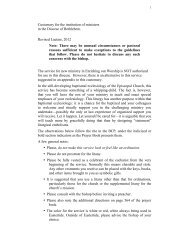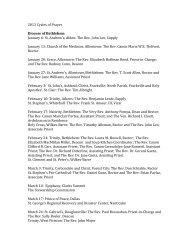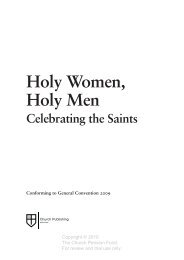Bishop Paul's Guide for Postulants - Diocese of Bethlehem
Bishop Paul's Guide for Postulants - Diocese of Bethlehem
Bishop Paul's Guide for Postulants - Diocese of Bethlehem
You also want an ePaper? Increase the reach of your titles
YUMPU automatically turns print PDFs into web optimized ePapers that Google loves.
Miss Manners assures us that in America the old rules <strong>of</strong> our New World culture<br />
still apply: only with medicos and clergy do Americans use doctoral titles as a <strong>for</strong>m <strong>of</strong><br />
address in normal social intercourse. In firsttier educational institutions in<br />
America, faculty are never referred to as Doctor, as a doctorate is merely a credential<br />
everybody has. This varies in other schools.<br />
“The Reverend Doctor” sounds very grand, doesn’t it? It is best not to do it when<br />
referring to self, ever. In any event, The Rev. Dr. is, strictly speaking, only to be used<br />
about those who have an honorary degree in the theological sphere, the D.D., or in<br />
older persons, the S.T.D. This status was originally granted only to those who had<br />
made some important contribution to the life <strong>of</strong> the Church and thus became its<br />
doctor in the original sense <strong>of</strong> “teacher”. In some places “The Reverend Doctor”<br />
has been stretched to include those who have earned a doctorate in a theological<br />
subject, but again, this can seem a little pretentious when used about oneself. It is<br />
totally incorrect <strong>for</strong> someone who has a doctoral degree in a nontheological subject to refer to<br />
self in church circles as The Reverend Doctorit is claiming a credential and authority in<br />
the Church that one simply does not have. It would make as much sense as walking<br />
into a hospital and expecting to be called “Doctor” because you once wrote a thesis<br />
on Proust.<br />
It is my observation that those who have obtained the nonresearch degrees are the<br />
most likely to indulge in “Rev. Dr.” language. If you undertake one <strong>of</strong> these entirely<br />
laudable continuing ed degrees, try to keep a sense <strong>of</strong> proportion about titles.<br />
Beyond the doctor business, given our baptismal theology, in church life on these<br />
shores we do not mix church designations with titles from other walks <strong>of</strong> life as do<br />
the British The Very Rev. General Sir Godfrey ffolkesJackson is possible in the<br />
U.K., <strong>for</strong> instance. Thus, if you are the mayor <strong>of</strong> Pleasantville and a podiatrist, try to<br />
avoid listing yourself as The Reverend and Honorable Doctor Jane Doe. It would<br />
work in England, but not here. See Gordon Wood, The Radicalism <strong>of</strong> the American<br />
Revolution <strong>for</strong> some startling cultural insights.<br />
The time to be generous with honorifics is when writing to or about others. If your friend or<br />
colleague has earned an academic theological degree or a D.Min, or has been<br />
honored with a D.D., it is very thoughtful and courteous to write to the friend or<br />
colleague as “The Reverend Doctor J. Doe.” They, <strong>of</strong> course, will be too modest to<br />
reply in that style, limiting their degree to initials after their name on the letterhead,<br />
but they will very much appreciate your noticing.<br />
If using a degree is desired, in America your signature line in a letter is “The Rev. J.<br />
Doe, Ph.D.” and not ever “The Rev. Dr. J. Doe.”<br />
Himself: even though he would qualify under the usual rules, please do not ever list<br />
the bishop as “The Rt. Rev. Dr.” in service folders. It’s just too much. By decree <strong>of</strong> a<br />
very early General Convention, our bishops are <strong>for</strong>bidden to use titles like Your<br />
Grace, My Lord, Your Excellency, etc, and there is a great deal to be said <strong>for</strong> this in<br />
America, where the episcopate confers no earthly lordship. In fact, convention<br />
action had to be taken to allow Presiding <strong>Bishop</strong>s to be called The Most Reverend.<br />
If you meet the Presiding <strong>Bishop</strong>, just call her/him <strong>Bishop</strong> as you would any other<br />
American bishop.<br />
And please do not kiss the ring.<br />
8


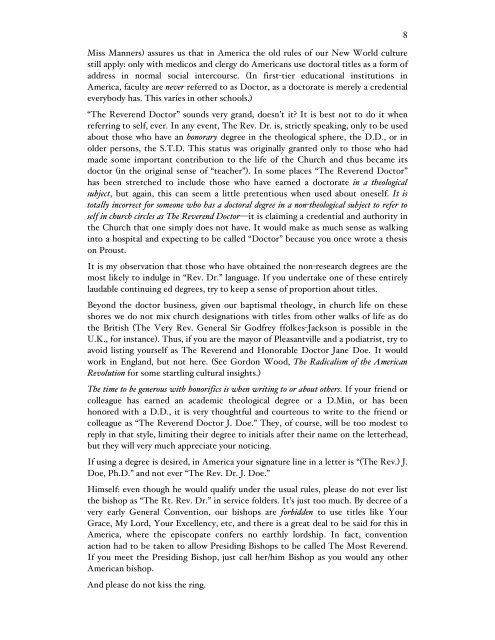
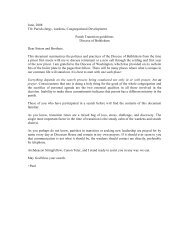
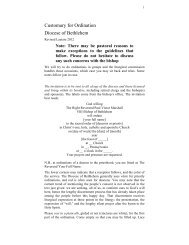
![Bishop Paul V. Marshall Nearly 16 years A biographical sketch [long]](https://img.yumpu.com/33803943/1/190x245/bishop-paul-v-marshall-nearly-16-years-a-biographical-sketch-long.jpg?quality=85)
